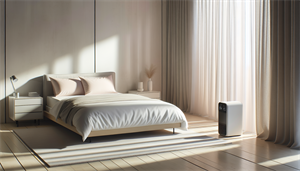Ah, the familiar symphony of snoring, a nocturnal nuisance that can fray nerves and disrupt sleep. But have you ever considered why some individuals snore more than others, or why your own snoring might be worse during certain times of the year?
The answer could lie in your immune system’s response to allergens, those microscopic irritants that can trigger everything from sneezing to, you guessed it, snoring. Ready to learn more about the connection between snoring and allergies? Let’s get started.
Key Takeaways
-
Snoring is caused by factors such as obesity, alcohol, smoking, sleep position, nasal congestion, and sleep apnea, with allergies being a common cause due to nasal congestion from allergens.
-
Allergic rhinitis is a major contributor to snoring, triggered by environmental irritants like dust, pet dander, and pollen, and can lead to chronic inflammation, mouth breathing, and disrupted sleep patterns.
-
Addressing allergies can improve symptoms and management of sleep apnea through treatments like intranasal corticosteroids and antihistamines while reducing nasal congestion and snoring.
The Symphony of Snoring: Unpacking the Nocturnal Nuisance

Consider for a moment the mechanics of snoring. This nocturnal noise, often the bane of shared sleeping arrangements, is not a purposeless annoyance. It’s actually a response to restricted airflow during sleep. When we sleep, our bodies are designed to maintain a steady flow of air into our lungs. However, certain factors can interfere with this process, causing the air to flow less smoothly, and leading to the vibrations we recognize as snoring.
Some common factors that can contribute to snoring include:
-
Obesity
-
Alcohol consumption
-
Smoking
-
Sleep position
-
Nasal congestion
-
Sleep apnea
Understanding these factors can help you identify potential solutions to reduce or eliminate snoring.
A common culprit? Allergies. Allergens, such as dust mites and pollen, can lead to nasal congestion, one of the most common causes of snoring. Understanding the anatomy of a snore is a key step in grasping how this works.
The Anatomy of a Snore
The sound of snoring is produced when the soft palate - that fleshy, flexible part towards the back of the roof of your mouth - vibrates. This happens when air can’t move freely through your nose and mouth during sleep, often because your airways have become narrowed. Imagine trying to drink a thick smoothie through a narrow straw. You have to suck harder to get the smoothie up the straw, and this can cause the straw to collapse on itself. The same thing happens when you have a blocked nose due to allergies. This blockage results in the generation of suction forces that constrict the upper airway, and as air flows past the soft palate, it causes this tissue to vibrate and produce the characteristic sound of snoring.
Swollen or blocked nasal passages can make this problem even worse. They can hinder nasal breathing during sleep, leading individuals to breathe through their mouths, often resulting in loud and disruptive snoring. But what happens when these breathing difficulties become more than just an occasional disruption?
When Breathing Becomes a Battle
For some people, breathing during sleep is a constant battle. Conditions like obstructive sleep apnea, obesity, hypothyroidism, lung or heart ailments, asthma, allergies, or anxiety can all contribute to breathing difficulties during sleep. Nasal congestion, often caused by allergies, can result in obstruction or deformation of the sinus cavities, causing a reduction in the nasal airway space and increased airflow speed, which can worsen the issue of snoring and lead to poor sleep quality. Even the way you sleep can exacerbate the problem. Certain sleeping positions can lead to the narrowing of airways, intensifying snoring.
So, what can you do to combat these issues? One simple solution is to adjust your sleeping position. Changing the angle of your head or posture can help alleviate nasal blockages and decrease snoring. But often, understanding the root cause of the problem is key to finding effective solutions. And when it comes to snoring, that often means taking a closer look at allergies.
Allergies and Airways: A Troublesome Twosome

If you’ve ever had a bad cold, you know how miserable it can be to try to sleep with a stuffy nose. Now imagine dealing with that congestion night after night. For allergy sufferers, this can be a reality. Allergies, particularly those that cause nasal congestion, are a leading cause of snoring.
Allergies can lead to physical changes like nasal congestion and inflammation of the tonsils and adenoids. This can cause the airways to swell and become smaller, restricting airflow and potentially leading to snoring. But not all allergies are created equal. Some are seasonal, while others can cause symptoms year-round.
Allergic Rhinitis and Its Role in Snoring
Allergic rhinitis, also known as hay fever, is a common condition characterized by symptoms such as nasal congestion, sneezing, and a runny nose. It’s a primary culprit when it comes to allergy-induced snoring. This is because the congestion and excess mucus it causes can lead to chronic inflammation of the sinuses, encouraging mouth breathing during sleep, and causing noticeable changes in chewing, potential muscle compensation, and disruption of normal breathing patterns in affected individuals.
But what triggers allergic rhinitis? The culprits can be found in our everyday environment. Common irritants include:
-
Household dust
-
Pet dander
-
Dead skin cells
-
Dust mites
These allergens are often more problematic at certain times of the year, leading to what we commonly refer to as “seasonal allergies.”
Seasonal vs. Year-Round Allergens
You’ve likely experienced the sneezing, itching, and runny nose that come with spring allergies. These are usually caused by seasonal allergens, such as different types of pollen from trees like:
-
oak
-
cedar
-
birch
-
ash
-
ragweed
These outdoor allergens elicit allergic responses during specific seasons, often leading to increased snoring during these times.
On the other hand, year-round allergens are typically indoor allergens like pet dander, dust mites, and mold, which can lead to snoring throughout the year. Whether you’re dealing with seasonal or year-round allergies, the result is often the same: nasal congestion that leads to impaired nasal breathing and potentially worsening or causing increased snoring. That’s why grasping the effect of these allergens on your sleep and health is crucial.
The Vicious Cycle of Sleep Apnea and Allergies
Sleep apnea is a serious condition in which your breathing repeatedly stops and starts during sleep. This can lead to a host of health problems, including daytime drowsiness, fatigue, and occasionally impaired mood and memory. Are you aware that allergies can worsen sleep apnea?
Allergies can result in swollen tissues and mucus accumulation, which can exacerbate the frequency of sleep apnea episodes. Additionally, allergic reactions causing swelling of the tonsils or adenoids can contribute to airway obstruction, further impacting sleep apnea. Identifying the symptoms of sleep apnea can be difficult, given their overlap with other sleep disorder symptoms.
Recognizing the Symptoms of Sleep Apnea
Loud and frequent snoring, along with gasping, choking, or pauses in breathing, are common symptoms of sleep apnea. However, these symptoms can be exacerbated in individuals with allergies. Allergens like dust mites and pollen can lead to nasal congestion, making it difficult to breathe through the nose during sleep. This can result in more noticeable snoring and a worsening of sleep apnea symptoms.
But sleep apnea is not just about snoring. Less frequently observed symptoms include:
-
Night sweats
-
Frequent awakenings
-
Teeth grinding
-
Morning headaches
-
Depression
-
Fatigue
-
Insomnia
-
Problems thinking
-
Impotence
-
Uncontrolled high blood pressure
-
Waking to urinate
-
Unrefreshing sleep
-
Heartburn
Recognizing these symptoms can help you seek timely treatment and prevent further health complications.
Treating Allergies to Tackle Sleep Apnea
Treating allergies can have a positive effect on sleep apnea by alleviating symptoms and decreasing the frequency and severity of apneas caused by nasal congestion. The typical treatments for allergic rhinitis that can aid in alleviating symptoms of sleep apnea include:
-
Intranasal corticosteroids
-
Antihistamines
-
Allergy shots
-
Lifestyle changes to reduce allergen exposure
Research in the scientific community has established a correlation between treating allergies and a reduction in symptoms of sleep apnea. The utilization of antiallergy medications has been found to enhance CPAP adherence and the quality of sleep in individuals with sleep apnea. This suggests that addressing allergies can serve as a long-term solution in the management of sleep apnea.
Nighttime Relief: Strategies to Prevent Snoring Caused by Allergies

While treating allergies and sleep apnea is important, prevention is always the best strategy. There are several practical steps we can take to prevent allergy-induced snoring. These range from making changes in our home environment to minimize exposure to allergens, to utilizing medication or natural remedies to manage our symptoms.
But one of the most effective strategies may be the one that’s easiest to overlook: our sleeping environment. The place where we rest our heads each night can either help or hinder our efforts to reduce snoring and manage allergies.
Creating an Allergy-Proof Bedroom
Our bedrooms can be a haven for allergens. Dust mites, pollen, mold, pet dander, and other allergens can accumulate in our bedding, carpets, and even the air, leading to increased nasal congestion and more frequent and louder snoring. But by taking a few simple steps, we can create an allergy-proof bedroom that helps us breathe easier and sleep better.
First, choose bedding materials carefully. Hypoallergenic materials such as:
-
bamboo
-
silk
-
cotton
-
linen
-
organic cotton
-
microfiber
-
wool
-
latex
can help reduce exposure to allergens that can lead to nasal congestion during sleep. Regularly cleaning your bedroom, including vacuuming and dusting, can also help reduce allergen levels. And consider using an air purifier to remove contaminants from the air.
Medication and Natural Remedies

Medication, particularly allergy medications, can also be a powerful tool in the fight against allergy-induced snoring. A combination of a nasal steroid spray and a non-sedating antihistamine is often the recommended course of treatment. Nasal steroid sprays can alleviate snoring caused by allergies by mitigating inflammation and reducing swelling in the nasal passages, thereby alleviating nasal congestion.
However, not all medications are created equal. Some, like oral decongestants, should be used with caution as they can cause difficulty sleeping even at low doses. Natural remedies can also be effective. These include:
-
thorough room dusting
-
ceiling fan cleaning
-
bedding washing
-
sleep position change
-
weight loss
-
alcohol avoidance
-
good sleep hygiene practice
-
nasal passage opening
-
peppermint oil use
-
ginger tea trial
Comprehensive Treatment Plan: Seeking Professional Help
Although lifestyle modifications and readily available treatments can mitigate snoring and allergy symptoms, if these symptoms persist or deteriorate, professional help should be sought. Professional healthcare providers can provide an accurate diagnosis and personalized treatment plans to effectively target the underlying causes.
Seeking professional help, such as consulting an allergist to pinpoint specific allergy triggers or participating in a sleep study for sleep apnea diagnosis, is a crucial step in managing snoring and allergies. And once a diagnosis has been made, healthcare professionals can recommend a range of treatment options, from lifestyle changes to medication to surgery, depending on the severity of the symptoms and the individual’s overall health.
From Diagnosis to Treatment
To tackle snoring, the initial move is to obtain an accurate diagnosis. This may involve a physical examination of the nose and mouth, allergy tests to identify specific allergens, and sleep studies to determine the presence of sleep apnea. Once a diagnosis has been made, healthcare professionals can recommend appropriate interventions, such as lifestyle changes, medication, or even surgery in some cases.
Typical treatments for snoring induced by allergies include intranasal steroids and less-sedating second-generation oral antihistamines. Nasal steroid sprays can help alleviate snoring caused by allergies by reducing inflammation and swelling in the nasal passages, thereby relieving nasal congestion.
Customized Solutions for Better Sleep
There isn’t a universal solution for treating snoring and allergies. Everyone is different, and what works for one person may not work for another. That’s why a variety of diagnostic tools are often employed by healthcare providers to tailor snoring treatments.
Sleep specialists may recommend the following for better sleep and improved overall health:
-
Allergy medication
-
Nasal steroid sprays
-
Non-sedating antihistamines
-
Nasal resistance valves
-
Devices that reposition the jaw and tongue to ensure unobstructed airflow
With a comprehensive and customized treatment plan, you can achieve better sleep and improved overall health.
Decoding Daytime Effects: How Allergies and Snoring Impact Daily Life

Snoring and allergies don’t just affect your nights. They can impact our daily lives, influencing our mood, performance, and overall health. Chronic snoring can lead to sleep deprivation, which can impair daytime performance and contribute to long-term health issues like:
-
mood and emotional disturbances
-
obesity
-
diabetes
-
cardiovascular disease
-
mental health disorders
-
cognitive decline
-
heart attack and stroke
Similarly, untreated allergies can deteriorate over time, leading to a notable reduction in overall quality of life and a compromised immune system. Allergy symptoms can contribute to decreased productivity, with individuals typically experiencing an average loss of 2.3 hours per day when symptomatic.
Beyond the Bedroom: Daytime Consequences
Daytime effects of chronic snoring can include:
-
Dangerous daytime drowsiness
-
Sleep disturbances
-
Chronic headaches
-
Decreased work performance
-
Cardiovascular problems
Besides, allergies can interrupt daily routines and potentially affect mental health.
Obstructive sleep apnea (OSA) is a common form of sleep disordered breathing that can result in episodic, intermittent hypoxia, sleep fragmentation, daytime sleepiness, and physical and mental health burden on patients. Neglected snoring and allergies can also lead to sleep disorders such as lower academic performance, behavioural issues, high blood pressure, cardiac issues, fatigue, decreased work productivity, and increased stress.
Long-Term Health Considerations
Chronic snoring can have potential long-term health repercussions such as:
-
Reduced sleep quality
-
Increased likelihood of obstructive sleep apnea (OSA)
-
Higher risk of hypertension and cardiovascular issues
-
Episodes of gasping, choking, and disrupted breathing during sleep
Untreated allergies can have a significant impact on quality of life, potentially leading to an allergic reaction and:
-
increasing the risk of health issues
-
reducing cognitive function
-
lowering productivity
-
worsening asthma
-
triggering skin conditions
-
increasing the risk of chronic health conditions.
Summary
In conclusion, snoring and allergies are more than just a nighttime nuisance. They can disrupt your sleep, impact your daily life, and even lead to serious health problems. But with the right knowledge and strategies, you can manage these conditions and improve your sleep quality.
Whether it’s making lifestyle changes, seeking professional treatment, or using medication and natural remedies, there are many ways to tackle this troublesome twosome. Don’t let snoring and allergies steal another night of peaceful sleep. It’s time to take control and start sleeping soundly again.
Frequently Asked Questions
Do allergies cause snoring?
Yes, allergies can cause snoring. Allergies often lead to nasal congestion and inflammation in the airways, which can restrict airflow through the nasal passages. This restriction forces breathing through the mouth during sleep, which can increase the likelihood of snoring. The swollen nasal tissues can also vibrate more easily, contributing to the snoring sound. Managing allergies through medication, nasal sprays, or lifestyle changes can help reduce snoring caused by this condition.
How do you stop snoring allergies?
To stop snoring due to allergies, try using nasal strips, nasal sprays, or allergy medication to open up the nasal passages and reduce inflammation. These methods can improve airflow and help reduce or eliminate snoring.
How do you flush allergens out of your system?
You can flush allergens out of your system by using saline solution to rinse your nasal passages, effectively removing mucus and allergens. It's a quick, inexpensive, and effective method for relieving nasal congestion.
What is the impact of treating allergies on sleep apnea?
Treating allergies can improve sleep apnea by reducing symptoms and minimizing the frequency and severity of apneas caused by nasal congestion. This can lead to better sleep quality and overall well-being.
What are the steps to establish an allergy-proof bedroom to reduce snoring?
Use materials like organic cotton, wool, bamboo, and microfiber for bedding to reduce snoring and establish an allergy-proof bedroom. These materials have moisture-wicking and antimicrobial properties that can help.


